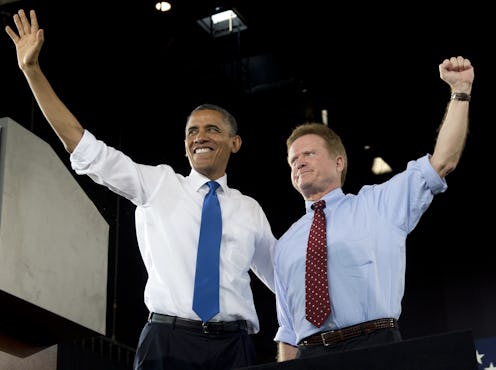News
Are There Any Surprise 2016 Candidates Left?
With Wednesday's announcement that former Rhode Island governor Lincoln Chafee will run for President as a Democrat in 2016, many people probably had the same reaction: huh? Chafee, a Republican Senator for eight years before winning his sole gubernatorial term as an independent and switching to the Democratic Party in 2013, is far from a big-name contender, so much so that some of his allies are reportedly "puzzled" by the decision, according to the AP. So, what other bewildering candidates might jump in the race? Here are four unlikely presidential runs you might see in 2016.
Obviously, there are certain fringe benefits to having been a presidential candidate, even if you don't win, so maybe that's weighing into the decision-making for some of these virtually-assured also-rans. The extra national profile, the distinction, the chance to raise your speaking fees or netting some TV time. Or, maybe ambition really does trump everything else — maybe when Chafee closes his eyes at night, he really does hear "Hail to the Chief" dancing through his mind?
In any event, there are still some potential long shot bids in waiting. Not all of them are quite the relative no-names Chafee was, sure, but all of them are nonetheless deeply unlikely to find 2016 success.
1. Jim Webb
A Vietnam veteran and former Democratic senator from Virginia, Webb formed an exploratory committee back in November 2014. If he decided to run, it would be something of a surprise — his only foray into elected office was his single Senate term, as he opted to retire in 2013 rather than seek reelection, and he won that seat in large part thanks to a campaign-derailing gaffe by his Republican opponent, George Allen (the infamous "macaca" moment).
In short, he's not terribly well-known to a national electorate, he isn't as experienced a campaigner as Clinton (or Sanders, O'Malley or Chafee), and a recent poll in his home state of Virginia found him trailing her by an 80 percent to 6 percent margin.
2. Joe Biden
There's a lot to like about Vice President Joe Biden, and god knows his name looks strange on a list like this. Often, an incumbent vice president would be viewed as a strong candidate going forward, but Biden's a strange and unique case.
In the first place, even as the second-in-line for the most powerful job on Earth, his national familiarity is actually lower than Clinton's. He's also ran twice before, which gives us a decent idea of what he'd be as a candidate — during his first run in 1988, his campaign was derailed by accusations he'd plagiarized a speech by British politician Neil Kinnock, and in 2008, he simply failed to gain any traction, finally ending his bid after receiving under 1 percent of the vote at the Iowa Caucus.
3. John Kasich
This one ought to be a sore spot for savvy Republicans, because on balance Kasich really should be a stronger candidate than he seems to be. He's the Republican governor of Ohio, perhaps the foremost battleground state in modern American politics (you've probably heard the phrase "as goes Ohio, so goes the nation").
He's also been on the front lines on a number of issues which, while anathema to liberal-minded voters, are clearly core GOP causes across numerous states where they're in control — anti-union measures, for example, as well as a raft of new restrictions on Ohio women's abortion rights. And he's confident enough as an on-stage and on-camera presence — before winning the governorship in 2011, he used to host on Fox News.
Simply put, Kasich really ought to have the same buzz around him that, say, Wisconsin Governor Scott Walker does. But sadly, that doesn't appear to be the case — based on his recent polling numbers, he could potentially miss the cut for the first Republican primary debate, which stands at only ten in a very overcrowded field.
4. Donald Trump
You don't necessarily have to be a no-name to be unlikely or hopeless. As a habitual pseudo-candidate over the last several years (by which I mean he keeps bombastically claiming he wants to run, and would win, but never has), Trump's entrance into the 2016 field would be the culmination of an awful lot of posturing, and by that virtue alone it'd be a surprise.
It would also, in all likelihood, go very poorly. Trump is a noted businessman and reality TV star, but in the political realm, he's evidenced very little in the way of policy ideas — unless being a birther counts, which is a pretty low bar. Perhaps my favorite Trump-ism from his days as a 2012 non-candidate is when he gave his take on how to keep gas prices low: just tell OPEC "you're not going to raise that f**king price."
Suffice to say, a Trump candidacy would be a little entertaining, but it would go nowhere fast. I predicted months ago that if he actually ran, it would likely make for a relatively quick exit, because his on-brand bluster and bravado probably precludes him from persevering through a bad loss. If he's trailing big in the polls heading into, say, the Iowa Caucus, would he really want to keep going?
Images: Getty Images (4)
